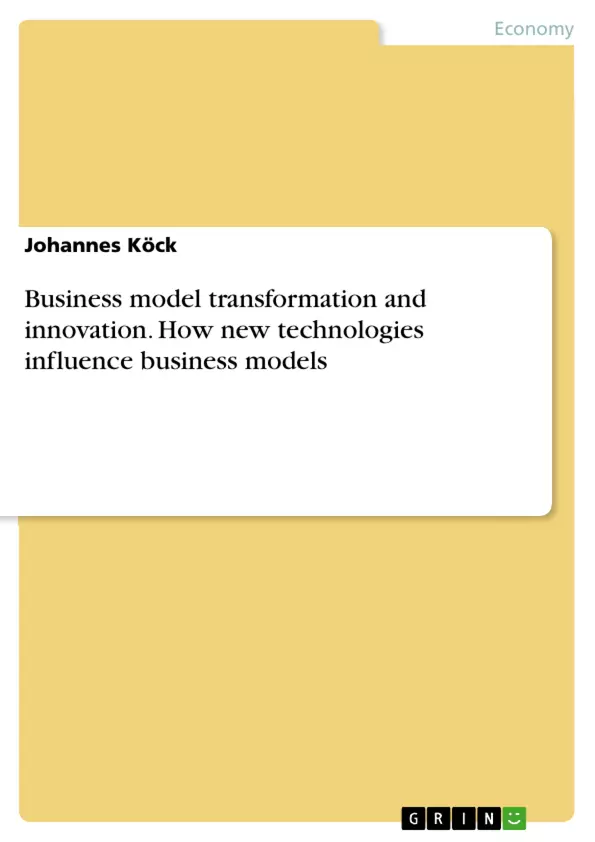This paper focuses on business models and how new technologies influence business models. By reviewing literature it can be realized that research regarding business models and new technologies considers two different areas:
One area is the capture of value from new technological innovations. A new product development should be linked to the development of a respective business model by defining value strategies for the new development. A new technological development does not automatically mean business success. Hence, a business model design for the new development is a key element in order to create value out of the new development.
The other research area – and this is the focus of this paper - looks at how new technologies influence business models. After a short introduction a practical example will be given of how a cooperation adapted its business model due to digitalization.
Inhaltsverzeichnis (Table of Contents)
- How new technologies change business models
- How new technology affected Rolls-Royce business model
- Appendix
Zielsetzung und Themenschwerpunkte (Objectives and Key Themes)
This paper analyzes how new technologies influence business models. The focus is on how companies can adapt their business models to embrace digitalization and transition from product-oriented to service-oriented models. The paper uses the example of Rolls-Royce to illustrate the impact of technology on business model transformation.
- The impact of technology innovation on business models
- The evolution of business models from product-oriented to service-oriented
- The role of digitalization in business model transformation
- The benefits and challenges of service-oriented business models
- The importance of data and communication in service-oriented models
Zusammenfassung der Kapitel (Chapter Summaries)
- How new technologies change business models: This chapter discusses the challenges and opportunities that new technologies pose for businesses, particularly in terms of adapting or creating new business models. It explores the concept of business model evolution, highlighting how technology innovation can drive changes in the way businesses operate. This chapter also introduces the key differences between product-oriented and service-oriented business models.
- How new technology affected Rolls-Royce business model: This chapter provides a real-world example of how technology has transformed a traditional business model. It examines the case of Rolls-Royce, a company that transitioned from selling turbines to offering “power by the hour” services, leveraging digitalization and remote maintenance technologies. The chapter analyzes the benefits for both the supplier and the customer, highlighting how this new service-oriented model creates a win-win situation.
Schlüsselwörter (Keywords)
This paper focuses on the influence of new technologies on business models, particularly the transformation from product-oriented to service-oriented models. Key concepts include digitalization, business model evolution, remote maintenance technologies, value proposition, customer relationship management, and data analysis. The case of Rolls-Royce is used as a practical example to illustrate these concepts.
Frequently Asked Questions
How does digitalization influence modern business models?
Digitalization drives a shift from product-oriented models (selling goods) to service-oriented models (providing ongoing value and solutions).
What is the Rolls-Royce "Power by the Hour" model?
It is a service-oriented business model where customers pay for the actual use (flying hours) of a turbine rather than buying the hardware itself.
Why is business model design crucial for new technologies?
A technological innovation does not guarantee success; a matching business model is needed to define value strategies and capture revenue from the innovation.
What role does remote maintenance play in business transformation?
Remote maintenance technologies allow companies to monitor products in real-time, enabling service-based contracts and proactive customer support.
What are the benefits of service-oriented models for customers?
Customers benefit from reduced upfront costs, higher reliability, and a focus on outcomes rather than maintenance of the equipment.
- Quote paper
- Johannes Köck (Author), 2015, Business model transformation and innovation. How new technologies influence business models, Munich, GRIN Verlag, https://www.grin.com/document/378126



